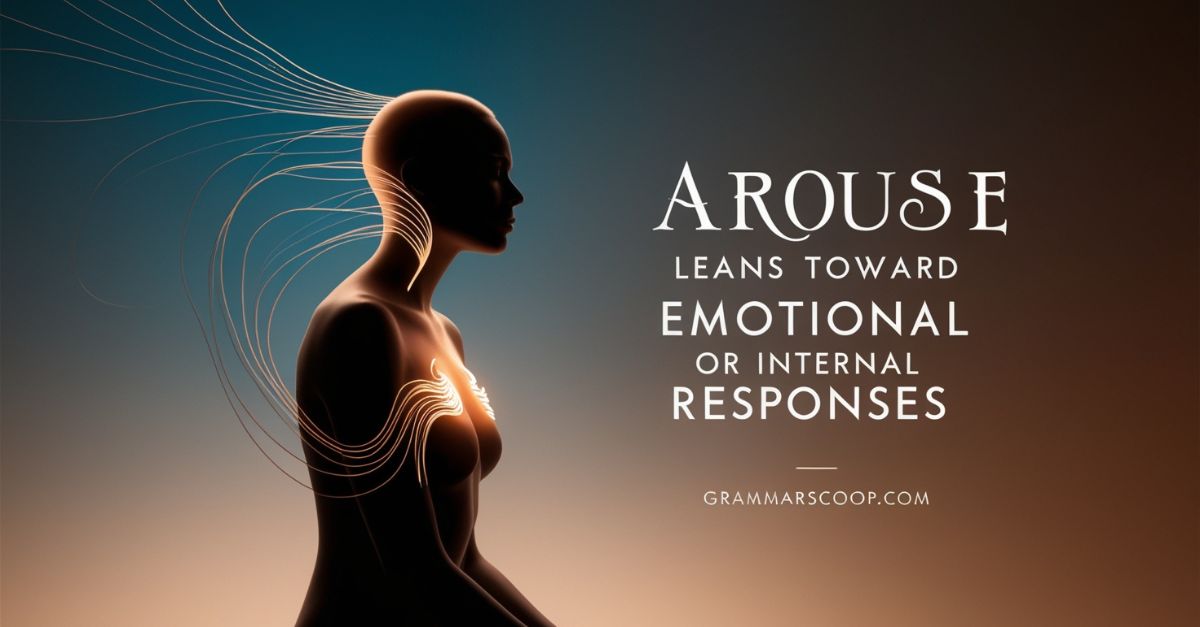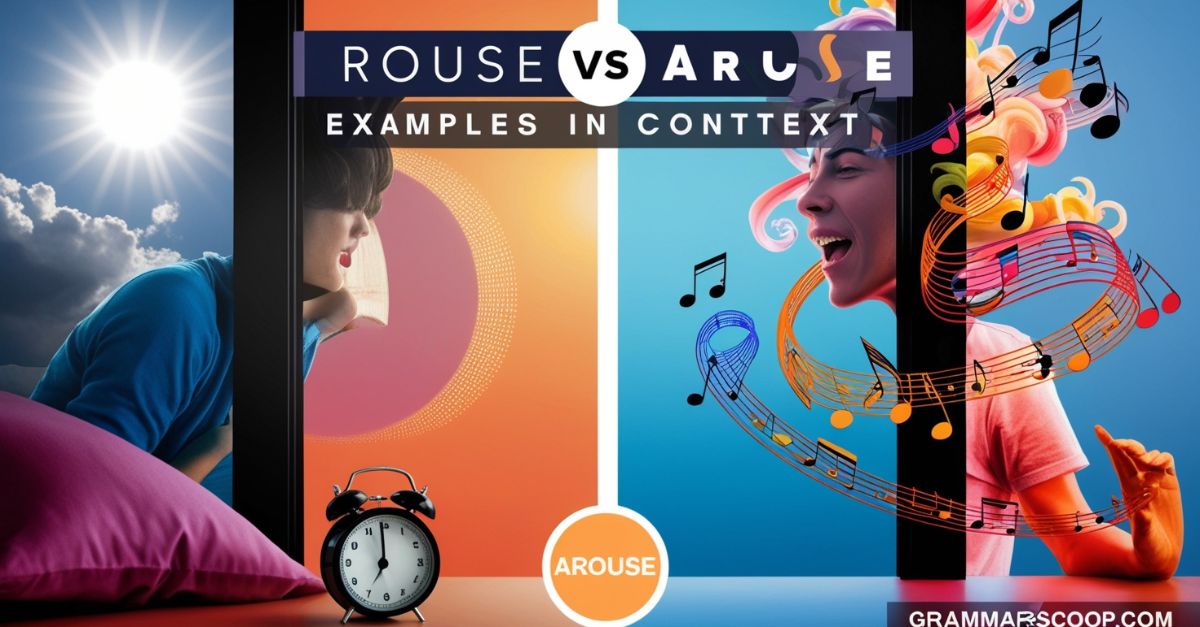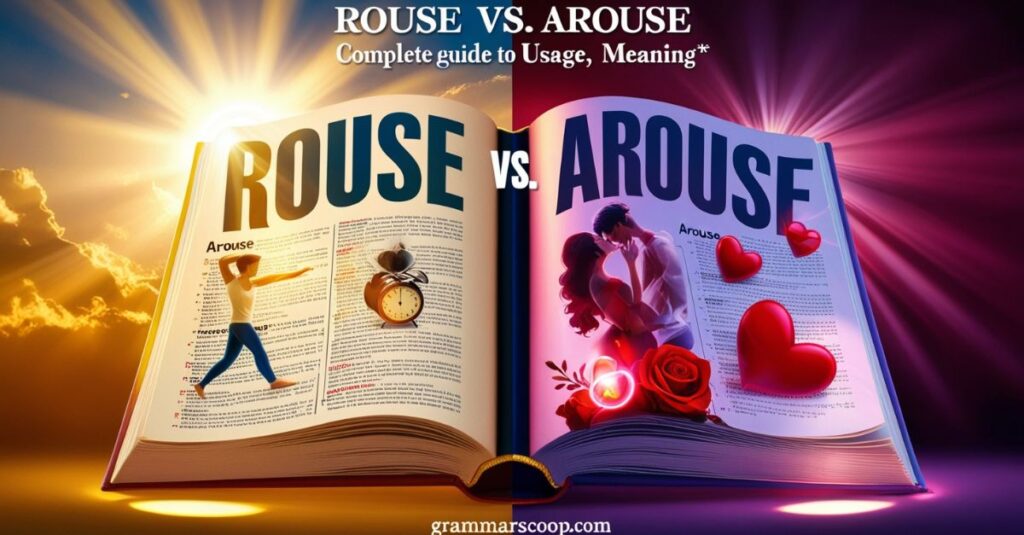Understanding the difference between rouse vs arouse is key to mastering subtle nuances in English. While they appear similar, these verbs carry distinct meanings and connotations. Confusing them is common, even for native speakers. In this guide, you’ll learn the full scope of their usage, origins, synonyms, example sentences, and more.
Quick Summary
In short, the difference between rouse and arouse lies in what’s being awakened. Rouse typically refers to a physical or behavioral awakening—like waking someone up or stirring a crowd into action. Arouse, on the other hand, deals with emotions, thoughts, or desires, often carrying a more psychological or even sensual tone. While they sound similar and share roots, their meanings diverge significantly in context. Remember: use rouse when the body is involved, and arouse when it’s the mind or feelings at play.
Rouse vs Arouse: Why People Mix Them Up
The confusion between rouse or arouse isn’t just a beginner’s mistake—it’s a trap even fluent speakers fall into. Why? These two verbs are near twins in both sound and spelling. At a glance, they look interchangeable. But they’re not.
They Sound Almost the Same
First, let’s talk pronunciation.
- Rouse rhymes with house.
- Arouse adds a soft prefix but still ends in that same -ouse sound.
When spoken quickly, the two can blur, especially in casual conversation. This phonetic similarity often leads writers to use the wrong word simply because it sounds right.
They Share Similar Meanings… on the Surface
Both words describe the act of waking or stirring something.
- Rouse might refer to physically waking someone up from bed.
- Arouse can describe waking up emotions like anger or curiosity.
At their core, they both relate to bringing something out of dormancy—whether it’s a sleeping person or a dormant emotion. That’s where things get tricky.
They Overlap in Context
Let’s say a movie “stirs your emotions.” Technically, that could be described as either rousing or arousing, depending on the tone. A rousing speech? That stirs action. An arousing image? That evokes emotion.
Here’s where tone matters.
- Rouse is more about movement, reaction, or rallying.
- Arouse leans toward emotional or internal responses.

Knowing which one to use depends not just on meaning, but on the emotional depth of what’s being described.
Tone and Connotation Make All the Difference
In writing, precision matters. Choosing rouse over arouse (or vice versa) can change the tone of your message:
- “The speech roused the crowd.” → Focus is on physical action.
- “The speech aroused the crowd.” → Focus shifts to emotional or provocative impact.
Rouse Meaning and Usage
Let’s start with rouse definition. According to the Merriam-Webster Dictionary, “rouse” means:
“To wake someone from sleep or inactivity; to stir someone to action.”
Rouse is most often used when referring to physical awakening or motivating someone to act.
Common Uses of “Rouse”:
- Waking someone from sleep
- Stirring someone to physical action
- Motivating a group to respond or rally
- Provoking into awareness
Examples:
- “She tried to rouse him from his deep sleep.”
- “The leader’s speech roused the crowd to protest.”
Rouse pronunciation
Phonetic: /raʊz/
Rhymes with: house, mouse, spouse
Past tense of rouse: roused
Arouse Meaning and Usage
Now let’s examine arouse meaning. The arouse definition provided by Collins Dictionary is:
“To evoke or awaken (a feeling, emotion, or response).”
Arouse is used more in emotional, psychological, or abstract contexts.
Common Uses of “Arouse”:
- Evoking emotions (anger, desire, suspicion)
- Stimulating interest or attention
- Triggering a response (mental or emotional)
Examples:
- “The movie aroused feelings of nostalgia.”
- “The news report aroused public outrage.”
Arouse pronunciation
Phonetic: /əˈraʊz/
Rhymes with: drowse, browse
Past tense of arouse: aroused
Rouse vs Arouse: Key Differences
Here’s a direct side-by-side comparison to highlight the rouse vs arouse grammar distinctions:
| Feature | Rouse | Arouse |
|---|---|---|
| Core meaning | Wake from sleep or inactivity | Evoke feelings or emotions |
| Usage | Physical, behavioral | Emotional, psychological |
| Formality level | Less formal | More formal |
| Grammatical role | Transitive verb | Transitive verb |
| Tone/Connotation | Neutral or action-based | Often sensual or emotional |
| Example sentence | “He was roused by the alarm.” | “Her speech aroused suspicion.” |
The difference between rouse and arouse often lies in context. If you mean to physically awaken or motivate, use rouse. If you’re talking about emotional stimulation, use arouse.
Synonyms for Rouse vs Arouse
Understanding synonyms helps reinforce each verb’s meaning and appropriate use.
Synonyms for Rouse
These words relate to physical awakening or action:
- Wake
- Awaken
- Stir
- Shake
- Alert
- Provoke (in physical sense)
- Activate
Synonyms for Arouse
These words focus on emotional or internal stimulation:
- Stimulate
- Evoke
- Ignite
- Spark
- Trigger
- Inflame
- Excite
Rouse vs Arouse Examples in Context

Examples are the best teachers. Let’s see how each word plays out in real-world usage.
How to Use Rouse in a Sentence
- “I couldn’t rouse him, no matter how loud I shouted.”
- “The coach roused the team after a weak first half.”
- “She was roused from a daydream by a knock on the door.”
How to Use Arouse in a Sentence
- “The scent of cinnamon aroused memories of childhood.”
- “His careless remarks aroused anger in the audience.”
- “The article aroused her curiosity.”
Explore further:
- Cacoon or Cocoon: Which Spelling is Correct?
- Past Tense of Swing? Is It Swing, Swang, or Swung?
- Re-sign Vs Resign? Understand the Proper Usage of Each
- Mouses vs Mice: What’s the Appropriate Plural of Mouse?
- Afterward or Afterwards: Is There Any Difference?
Origin of Rouse vs Arouse
Both words are etymologically linked, which explains their similarities.
Origin of Rouse
- First appeared in English around the 15th century
- Likely derived from Middle French reuser (“to shake, stir”)
- Initially meant “get up” or “wake up”
Origin of Arouse
- Emerged in the 16th century
- Built from rouse with the prefix a- (intensifying)
- Eventually adopted emotional and sensual overtones
Knowing the etymology of rouse and arouse helps understand their evolving usage over time.
Common Mistakes and Misuses
Many confuse these verbs, especially in writing. Let’s look at typical errors.
Misusing “Arouse” in Place of “Rouse”
Wrong: “He tried to arouse her from sleep.”
Right: “He tried to rouse her from sleep.”
Using “Rouse” When Talking About Feelings
Wrong: “The speech roused passion.”
Right: “The speech aroused passion.”
Grammar Tip:
If the object is a person’s emotion or mind, go with arouse.
If it’s a person’s body or behavior, use rouse.
Quick Reference Guide
Need a fast reminder? Use this cheat sheet.
Rouse when…
- You’re waking someone up physically
- You’re stirring someone into action
- You’re causing alertness or movement
Arouse when…
- You’re triggering an emotional reaction
- You’re stirring curiosity, anger, or suspicion
- You’re dealing with feelings or psychology
Bonus: Memory Trick to Remember the Difference
Rouse rhymes with house → Think of waking up in a house.
Arouse starts with an “A” for Affection, Anger, Attraction → Think emotions.
Certainly! Here’s the Etymology section rewritten with clarity, rhythm, and detail, while sticking to your tone and SEO instructions:
Etymology: Where Do These Words Come From?

Understanding the etymology of rouse and arouse helps explain why they look and sound so alike—and why their meanings overlap yet diverge in subtle ways. Let’s dig into their origins and how their meanings evolved over time.
Origin of Rouse
The word rouse traces back to Middle English, first appearing in the 15th century. It’s believed to have stemmed from the Old French word reuser, meaning “to shake” or “stir.” Early usage often described the act of rising or getting out of bed.
In fact, rouse was commonly used in nautical settings. Sailors might say, “Rouse yourself, man!”—a call to wake up or snap into action. This connection to physical movement and urgency stuck around, shaping the modern rouse meaning we use today.
Quick fact: In early English literature, rouse was often used to describe soldiers being awakened for battle.
Origin of Arous
The word arouse came later—around the 16th century—and it was quite literally built from rouse. By adding the prefix “a-”, which typically means “toward” or “into a state of,” the word became a more intensified version of rouse.
At first, arouse simply meant to wake or stir more forcefully. But as the centuries rolled on, it took on more abstract and emotional meanings—especially those tied to desire, anger, suspicion, or interest.
Today, arouse is largely reserved for internal or emotional awakening, making it more cerebral, subtle, and psychological than its root word.
Grammar note: The prefix a- in English verbs (like arise, awake, arrest) often adds intensity or direction—which helps explain why arouse feels deeper or more layered than rouse.
Let me know if you want a visual timeline or origin chart added here. It could really boost readability and SEO performance.
FAQs About Rouse vs Arouse
- What does rouse mean?
It means to wake someone from sleep or motivate someone into action. It has a physical or behavioral implication.
- What does arouse mean?
It refers to evoking emotions, desires, or mental states like curiosity or suspicion.
- What is the difference between rouse and arouse?
Rouse is physical; arouse is emotional or psychological. That’s the core difference between rouse and arouse.
- How to pronounce rouse and arouse?
Rouse: /raʊz/
Arouse: /əˈraʊz/
- When to use rouse vs arouse?
Use rouse when dealing with physical states (like waking someone up). Use arouse when referring to feelings or inner responses.
- What is the past tense of rouse and arouse?
Rouse: roused
Arouse: aroused
- What is the origin of rouse and arouse
Origin of rouse: Middle French reuser, meaning “to shake.”
Origin of arouse: Built on rouse with added prefix a- to intensify.
Final Thoughts on Rouse vs Arouse
Both verbs are powerful tools in English. While they share roots, their usage diverges meaningfully. Mastering the rouse vs arouse distinction will sharpen your writing and make your communication more precise.
Remember:
- Use rouse for the body.
- Use arouse for the heart and mind.
Whether you’re a student, a professional writer, or just refining your vocabulary, getting this pair right adds polish to your English.

Lisa Morris is a seasoned blogger and language enthusiast with a passion for making grammar simple and engaging. At Grammar Scoop, she shares clear, concise tips that help readers master the rules of English with confidence.






